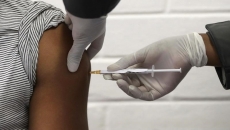Health experts are concerned the general public may be focusing on the wrong figures when analyzing the efficacy of COVID-19 vaccines.
And they worry that will lead to unnecessary hesitancy at a time when Canada's inoculation rollout needs to ramp up.
The recently approved Oxford-AstraZeneca vaccine, and the shot by Johnson & Johnson that could be next in line for authorization, showed 62 and 72 per cent efficacy in preventing COVID-19 infections in their respective clinical trials.
Compared to the 95 per cent effectiveness of mRNA vaccines from Pfizer-BioNTech and Moderna, it seems like a glaring difference. But experts stress that when it comes to preventing COVID hospitalization or death, data from trials showed all four vaccines were perfect.
"Those are the outcomes that Canadians ought to be focused on, because that's really what we care about preventing," said Charles Weijer, a bioethicist at Western University.
Weijer says he understands why the public is gravitating towards those figures, since we're used to efficacy in terms of treatments for disease.
A cancer treatment that's 95 per cent effective would be preferable to one that's 60 or 70 per cent, he said, but vaccines and other public health interventions need to be analyzed differently.
Dr. Sumon Chakrabarti, an infectious disease specialist in Mississauga, Ont., says efficacy in a trial is calculated by comparing the number of people who got COVID after receiving a vaccine to the number of those who got it after being given a placebo.
Many of those who did become infected after getting a vaccine in the trials experienced mild illness, according to the data, which Chakrabarti says isn't a big concern.
Getting hung up on the wrong figures can be problematic, he adds, if it leads to a perception that the AstraZeneca or Johnson & Johnson vaccines are inferior.
"When you look at deaths and hospitalization, it doesn't matter if it was Johnson & Johnson, AstraZeneca, Pfizer or Moderna, it was freaking amazing" Chakrabarti said. "Thousands of participants in the treatment arm of the trials, and not a single person died, not a single person was hospitalized."
Chakrabarti says the timing of the trials may have impacted efficacy, with Pfizer and Moderna testing its product when the COVID burden was relatively lower in parts of the world. Johnson & Johnson and AstraZeneca, meanwhile, had their trials later when circulation was increasing, and more transmissible variants were spreading at a rapid pace.
While that could mean the efficacy of mRNA vaccines in preventing infection is lower than 95 per cent, Chakrabarti says it doesn't change the zero hospitalizations and deaths shown in their trials.
Those will be the key numbers going forward, he says. While case numbers may continue to increase through Canada's vaccine rollout, restrictions could lift as deaths and hospitalizations drop.
"Right now we have three tools that prevent death and hospitalization that can help us get out of this situation," Chakrabarti said. "So my message is just get whichever vaccine you can get first."
Canada's National Advisory Committee on Immunization (NACI) said this week that it didn't recommend the AstraZeneca jab for those over the age of 65, arguing the trials didn't offer enough efficacy evidence in that age group. Health Canada said days earlier that real-world data suggests the shot is effective in older populations.
France and Germany, which didn't initially recommend AstraZeneca for seniors, have since reversed that decision.
Weijer says while the messaging with AstraZeneca may have taken a step back this week, there's opportunity moving forward to present other vaccines in terms of the metrics that matter most.
Weijer says the ease of a single-dose vaccine like Johnson & Johnson's could be "hugely important" for Canada's vaccine rollout. But people need to be willing to take it.
"If individuals are thinking, 'Well, I'm gonna hold out for a vaccine that I perceive to be better,' that's a mistake," Weijer said. "The key is getting all of us vaccinated as quickly as possible."
Chakrabarti anticipates some will dismiss the AstraZeneca jab, adding that those responsible for administering the vaccine need to set up Plan Bs to make sure doses aren't wasted.
While he's concerned the "well has been poisoned" around AstraZeneca, Chakrabarti says it's up to public health messaging experts to reverse that going forward.
"If we put these vaccines on a level playing field and look at the same important metrics, they are all performing the same," he said. "That's what the messaging should be."






